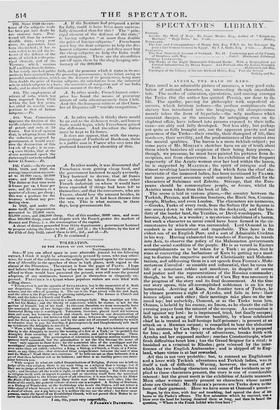TOLERATION.
TO THE EDITOR OF THE SPECTATOR.
Northamptonshire, 22(1 May.
SIR—If you can afford space in your admirable journal for the following extract, I think it might be advantageously perused by some, who may other- wise, for want of due reflection on the subject, be imposed upon by the assump- tion of liberality in the speeches of those in high places, with regard to the claims of the Dissenters. The extract is from the pages of PAINE. I hope and believe that the time is gone by when the name of that terrific individual affixed to them would have prevented the perusal, even still more the general adoption, of any sentiments, however just in themselves or eloquently ex- pressed. PREJUDICE is a tyrant whose populous realms are ever filled with willing slaves. TotERATIoIliS not the opposite of INTOLERANCE. but is the counterfeit of it. Both are despotisms. The one assumes to itself the right of withholding liberty of cull. science, and the other of granting it. The one is the Pope armed with tire and fagot, and the other is the Pope selling or granting indulgences. The former is Church and State. and the letter is Church and Traffic. " But Toleration may he viewed in a much stronger light. Man worships not him- self, but his Maker; and the liberty of conscience, which he claims, is not for the service of himself, but of his God. In this case, therefore, we must necessarily have tbe associated ideas of two beings—the mortal who renders the worship. dud th Immortal Being who is worshipped. Toleration. thereffire, placed itself not between man and man, nor betweeu church and church, nor between one denomination of retigiou and another; but between God and man; between the being who worships anti the Being who is worshipped; and by the same act of assumed authority by which it tolerates man to pay his worship, it presumptuously and blasphemously sets itself lip to tolerate the Almighty to rec. ice it. " Were a bill brought into any Parliament, entitled 'An Act to tolerate or grant liberty to the Almighty to receive the worship of a Jew or a Turk.' or ' to prohibit the Almighty from receiving it,' all men would startle, and call it blasphemy. 'rhere Would be an uproar. The presumption of toleration in religious matters would then tat:sent itself unmasked; but the presumption is not the less because the name of 'man' only appears to those laws; for the associated idea of the worshipper aud the worshipped cannot be separated. ho then art thou, vain dust and ashes, by what- ever name thou art called—whether a King, a Bishop, a Church, a State, or a Parlia- ment, or any thing else—that ()blindest thiue insiguiticance between the soul of man and its Maker? Mind thine own concerns. If he believes not as thou believest, it is a proof that thou believest trot as he believes; and there is no earthly power can deter- mine between you. " With respect to what are called Denominations of Religion, if every one is left to judge of its own religion. there is no such thing as a religion that is wrong; but if they are to judge of each other's religion, there is no such thing as a religion that is right ; and therefore all the world is right, or all the world is wrong. But with respect to religion itself. with, nit regard to names, and as directing itself from the universal family of mankind to the Divine object of all adoration. it is man bringing to his Maker tkeftuits rf his heart ; and t hough those fruits may differ Isom each other like the fruits of the earth, the grateful tribute of every one is accepted. A Bishop of Durham, or a Bishop of Winchester, or the Archbishop who heads the Dukes. will nut retuse a tithe-sheaf of wheat because it is not a cock of hay, nor a cock of hay because it is not A sheaf of wheat, nor a pig because it is neither the one nor the oilier; but these same persons, under the those of an Established Church, will not permit their Maker to re- ceive the varied tithes of man's devotion."
I am, Sir, yours very respectfully, A Faamaa's DAUGHTEE.




















 Previous page
Previous page